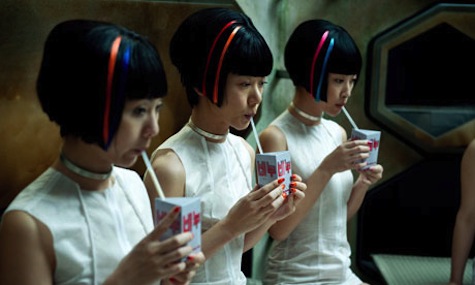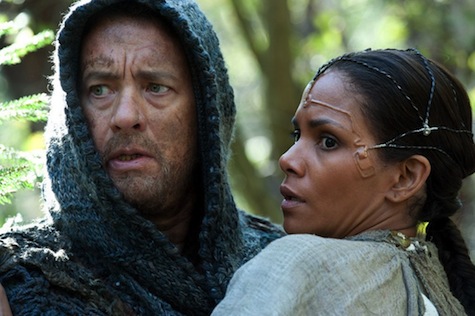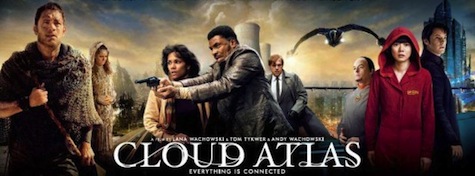Cloud Atlas was never destined to be popular. When David Mitchell published a novel featuring six different stories set in six different time periods, nested one inside the other like Russian dolls, Hollywood said an adaptation was impossible. When the Wachowski Siblings bought the rights to the book, studios were still doubtful. Even after the film had been financed, investors backed out left and right. Nobody but the filmmakers seemed to believe that audiences could handle a movie this big .
As it turns out, the naysayers were right. Cloud Atlas flopped at the domestic box office, earning a paltry $9.6M its opening weekend against a $100M+ production budget. The film polarized critics; it barely scraped the 60% mark on Rotten Tomatoes; and it earned the wrath of many a movie-goer who found the three-hour film too long and confusing. Exploring the continuity of transmigrating souls across the centuries is not typical Hollywood fare, especially not for a Tom Hanks film. If the Wachowskis had been gunning for a new Matrix, what they seemed to get was another Speed Racer.
I adore Cloud Atlas. It’s huge, smart, ambitious, profound—everything a Hollywood film ought to be. And I’m not alone in saying so. The movie received a ten-minute standing ovation at its premiere at the Toronto Film Festival—a sign that the filmmakers had created something very special. Only later did the negative buzz begin. But those movie-goers who enjoyed Cloud Atlas didn’t just like it—they loved it, passionately. Some have even called this film a masterpiece. So who’s right?

Cloud Atlas tells six stories across six eras. Each story has its own characters, setting, and plot… and each story is a different genre . First there’s the redemption drama of Adam Ewing, the slave trader fighting for his life on the high seas. Next is the romantic tragedy of homosexual composer Robert Frobisher, set in pre-World War II England. Third up, a tight thriller about corporate wrong-doing at a nuclear power plant, starring Halle Berry as an investigative journalist in 1973. Number four is a modern-day comedy about a book publisher confined to a nursing home. Next comes a sci-fi epic taking place in 22nd century “Neo Seoul,” the star of which is a synthetic human slave. Finally, there’s the fantasy-esque tale of a post-apocalyptic future in which humanity has regressed into primitive tribes whose language is barely recognizable, with an elite few retaining the high technology of yesteryear and striving to escape the planet.
Holy interlocking stories, Batman! All of that is one film. The first act sets up the six tales in a (mostly) linear fashion, but from there forward, the brakes are off and (unlike in the book) the stories become as interwoven as threads of karma itself. One moment we’re in a car chase through 1970s San Francisco ; the next, a tension-filled composer’s mansion in 1936; then we’re soaring through the VFX-filled skies of future Korea; then it’s back to the high seas once again. Never has one movie jumped across so many settings and eras—and this isn’t even a time travel story.

And yet there’s a beautiful continuity to the whole thing. The six stories interlock like pieces of a puzzle, each one containing bits of the others. Every protagonist shares a birthmark in the shape of a comet. Sets and props are shared between the tales. Each story has a character reading a journal, book, or video from the previous era, which in turns affects the next storyline. And then there’s the “Cloud Atlas Sextet” itself, which not only forms the central story arc of 1936, but appears as a chant amongst the fabricants of Neo Seoul; as a swelling score in 1849; in a record shop in 1973; and so on. (The “Cloud Atlas Sextet” also refers to the six main characters and their connected fates.)
As dizzying as all this might sound, the storytelling is seamless . Great writing and masterful editing play a major role: the film might cut from a bursting fire hydrant to a surging sea, or from a prisoner in the future to a prisoner in the past; every cut seems imbued with meaning. ( The movie was nominated for the Academy Award for Best Film Editing.) The Wachowskis (and co-director Tom Twyker) also did an amazing job adapting the book into a screenplay, especially considering that the original novel has an entirely different structure than the film.

Another element that ties things together is the clever casting. While the characters in each time period are unique, the same actors play all the roles. In various time periods, Halle Berry plays a a young black reporter, an old Asian man, and a white Jewish woman. Ben Whishaw is not only Frobisher, but Timothy Cavendish’s freckly-faced sister-in-law. And there’s meaning implied in many of the casting choices. Hugo Weaving always plays an oppressive character such as a slave trader or a Nazi. Halle Berry is always good, gradually rising from slavery to become a savior of mankind. Tom Hanks is generally selfish, except when he meets Halle Berry and falls in love, while a similar echo occurs between Jim Sturgess and Doona Bae, whose love affair repeats in both 1849 and 2144. All of this was added by the filmmakers.
As an aside: m any critics found fault in casting actors and actresses in roles that required make-up to change their sex or race. But these casting choices are thematic, reinforcing the idea that all beings eventually get reincarnated into every race, sex, clan, and situation. Regardless of whether you believe this notion, the movie does an amazing job of expressing it; it misses the point to get caught up in political correctness here.

In short, this movie is completely unique, unlike anything that came before it. It’s perhaps no surprise that so many rotten tomatoes got thrown at the screen—audiences tend to prefer their entertainment relaxing rather than soul-searing and thought-provoking—but the greatest stories are the ones that voyage unflinchingly into the depths of the human condition. So while Cloud Atlas may never be a movie with mass appeal, I do think it will become a timeless classic, because it’s just too good to become anything else.
At the very least, Cloud Atlas will always have a special spot on my own media shelf. In this life, and the next, and maybe even the one after that.
Brad Kane writes for and about the entertainment industry. You can c heck out his website, like his page on Facebook, follow him on Twitter, or just email him at worldsofstory@gmail.com.










